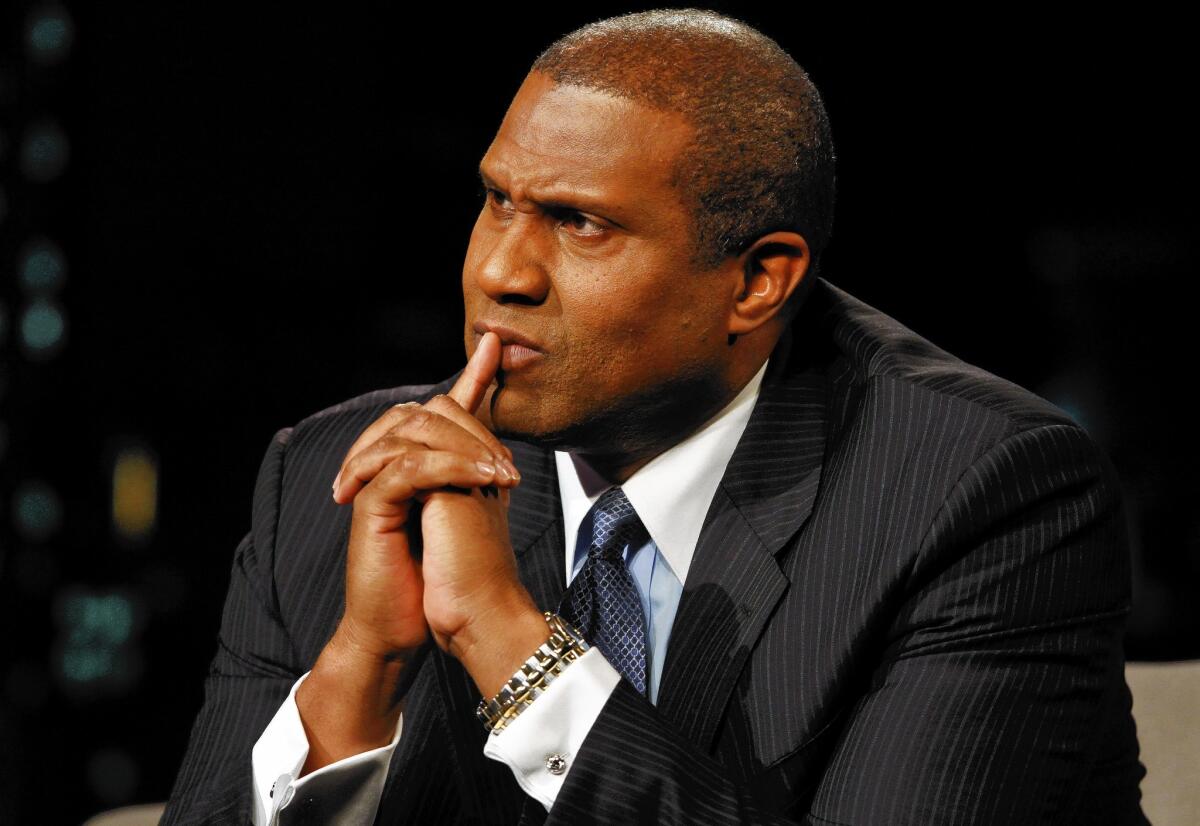Tavis Smiley’s bumpy 10th anniversary with PBS

- Share via
First he lost his studio and station home. Then some public radio stations dumped him after he criticized President Obama. Earlier this year, Arsenio Hall swept in and poached his executive producer and other key staffers. Oh, and the tendons in his ankles needed surgery.
Life ain’t always easy for Tavis Smiley.
No need for a pity party: The 49-year-old veteran broadcaster last month signed a new two-year deal with PBS for his self-titled late-night talk show, where VIPs from general-turned-statesman Colin Powell to dancer Mikhail Baryshnikov to author Amy Tan have turned up for in-depth discussions. He also co-hosts, with the scholar Cornel West, the public radio show “Smiley & West.”
PHOTOS: Behind the scenes of movies and TV
As one of the most recognizable black media personalities in America, he’s sufficiently well-known that next year he’s due for his star on the Hollywood Walk of Fame.
But as Smiley recounted from his Leimert Park offices one morning recently, the PBS deal was hardly a foregone conclusion, given some of the hurdles he’s faced in this, his 10th year on the network.
“This year was supposed to be a celebration of all the stuff we had done together,” he said, his briefcase crammed with dog-eared folders containing documents related to his various current projects.
That includes notes for “Death of a King,” the book he’s co-authoring about the last year of the life of Martin Luther King Jr. His right foot was sheathed in an orthotic boot because of nagging tendon trouble; he was due for surgery the next day, then weeks of physical therapy. One wall was covered with framed awards and honorary degrees.
“It’s getting harder and harder to make this stuff work,” he said. “Every week, I’m beating my head against a wall, trying to raise money.”
PHOTOS: Celebrities by The Times
Such is the life of a public-television personality. Unlike most TV hosts, who simply do their jobs and collect a paycheck from a network, Smiley has to go out and raise most of the money for his program, which costs between $7 million and $8 million a year to produce. PBS generally contributes about $1 million of that sum. The rest comes from corporate sponsors, which Smiley has to round up himself.
The sluggish economy and reduced corporate spending have threatened the show’s viability. But luckily for Smiley, Wal-Mart, a longtime sponsor, stepped up again, this time with a three-year commitment. (PBS can only offer a maximum of two years on renewals because, as a government-supported entity, it must be periodically authorized by Congress.) But Wal-Mart covers only about a quarter of the costs.
“What you’re hearing from him is someone who’s tired of being out looking for money all the time,” said Paula Kerger, the president and chief executive of PBS who added that the network renewed “Tavis Smiley” because it values the host’s views. “He adds another perspective.”
But penny-pinching companies aren’t his only worry. The world is changing in ways that don’t always favor the reflective, tweedy atmosphere of public television.
“As the handlers get younger and younger and as the artists crave more and more to be in the social media zeitgeist, it becomes harder and harder for my producers to get through to clients the value of being on PBS,” he said. “It’s not an easy sell.”
Most guests on “Tavis Smiley” get gentle questions and a remarkably sympathetic ear, but outside of the studio, Smiley can be plenty scrappy. That may be partly because of his upbringing, when he sometimes had to fight for attention.
Smiley grew up in Indiana, where he and his mother, along with his stepfather and 10 other family members, were packed into a mobile home. The kids were raised in the Pentecostal tradition and forbidden from listening to pop music or watching most TV shows.
While still in college, Smiley worked as an aide to then-Los Angeles Mayor Tom Bradley. After an unsuccessful bid for the Los Angeles City Council, he began filing commentaries for local radio in the early 1990s. His career as a media personality was born.
It’s been an often-bumpy ride since then. Smiley hosted “BET Tonight,” a groundbreaking public-affairs show for the cable network. But he and the network abruptly parted ways in 2001 after he scored a major interview with terrorist-turned-housewife Sarah Jane Olson. He sold that interview to ABC News, which BET viewed as a competitor.
More recently, he’s angered some radio listeners with his criticisms of President Obama. In an interview with the New York Times, he suggested in 2012 that Obama is “boxed in by his blackness” and often treated black people callously. The comments led several public radio stations to dump his program. Smiley has remained unapologetic about his views.
But the problems closer to home have been worse. In late 2010, KCET-TV, which presented “Tavis Smiley” to stations across the country, announced it would leave the network after years of disputes over dues and other issues. The conflict had nothing to do with him personally, yet he nevertheless paid a huge price: He was forced to move off the station’s Silver Lake lot and rent studio space at a commercial facility. Smiley’s show is now presented locally on PBS SoCal, the former KOCE-TV in Orange County.
“We go overnight to paying for office space, studio rental, parking stalls for my staff — we go overnight to paying full freight at a commercial outlet here in town,” Smiley said. “That dropped us into a deep, deep multimillion-dollar hole.”
PBS slightly increased its stipend, making up some of the shortfall. But Smiley still had to scramble to make ends meet. “I can’t tell you how close we were to be taken under by that,” he said.
Then, earlier this year, his longtime executive producer, Neal Kendall, announced he was leaving to work on Arsenio Hall’s new late-night show. On his way out, Kendall took along a few of his most experienced crew people.
“It gutted my staff,” Smiley said. “I don’t begrudge anyone leaving. They gave me a good 10 years. ... [But] I didn’t like the way it was done. ... It was quick, it was sudden. I didn’t see it coming.”
Kendall and Smiley, who worked together every day for 10 years, haven’t spoken since.
Reached for comment, Kendall wrote via email: “Tavis is one of the most gifted broadcasters of my generation and I hope he continues to do the show for a very long time.” As it happens, Kendall was ousted as Hall’s executive producer shortly after the show premiered this fall and is working on his next move. Smiley replaced him with Jacoba “Coby” Atlas, a former programming executive for PBS.
Given all the problems, one might well wonder why Smiley bothers.
But he knows that the nightly show keeps him in the limelight. He relishes being one of the few African Americans on NPR and PBS (“It doesn’t get any whiter than PBS,” he is fond of saying). And he loves being at the center of the cultural swirl from the Left Coast, his adopted home.
“My friends seem to think that smart television and smart radio are a wholly owned subsidiary of the Eastern Seaboard,” he said.
Plus, he just likes talking to people. The fact that he’s doing it televised is just a bonus.
“When I’m in that chair, conducting those conversations,” he said, “that’s as close to heaven as I get.”
‘Tavis Smiley’
Where: KOCE
When: 11 p.m. weekdays (1 a.m. this week)
Not rated
More to Read
The complete guide to home viewing
Get Screen Gab for everything about the TV shows and streaming movies everyone’s talking about.
You may occasionally receive promotional content from the Los Angeles Times.







